Sliding Doors: What if Falkirk... had given Sir Alex Ferguson the manager's job?
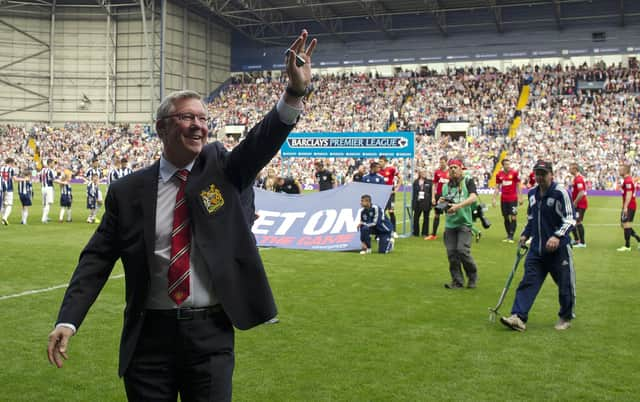

One of the greatest football managerial careers, and it started here.
At Falkirk, and in Falkirk. But it didn’t work for Falkirk.
Now, Sir Alex Ferguson is revered as a football tactician, a man manager and a leader. A Harvard scholar crafted from the Clydeside dockyards via the dugouts of Pittodrie, Old Trafford and… Firs Park.
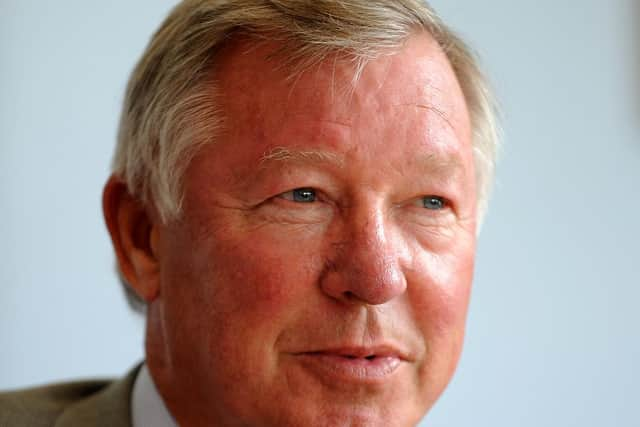

Advertisement
Hide AdAdvertisement
Hide AdBack then he was a fledgling manager. One of the most famous faces, voices, careers in the game began down Firs Street at the back of what is now Central Retail Park.
It’s a famous story, how from humble beginnings at the little old Shire, grew this great football figure who conquered the world with Manchester United.
But it could have been so different for neighbours Falkirk, where Ferguson spent four years as a player, working his way from players’ union official to become coach at Brockville, scoring 57 times in 128 games along the way.
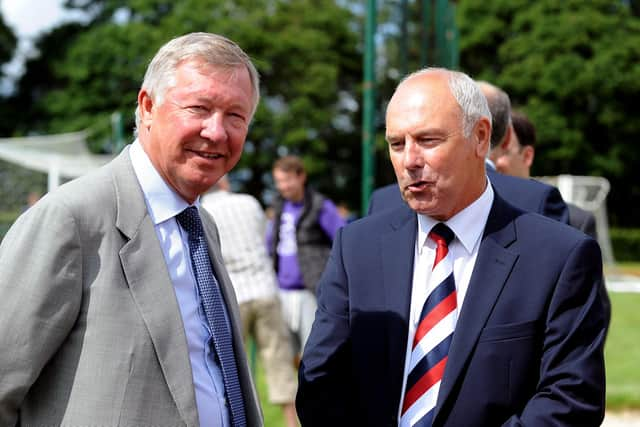

Never mind fledgling manager, he was a formative years coach, organising the training at Bleachfields.
Advertisement
Hide AdAdvertisement
Hide AdWhen Willie Cunningham, the man who signed the striker from Rangers for £20,000 was sacked, the senior figure in the dressing room and on the training pitch was much interest, but also an obvious candidate close by to make the step up.
But it didn’t happen.
Falkirk went with Cup-winning captain John Prentice, offering him the chance to make amends for a poor first spell where only 21 games of 79 were won – a win ratio of just 39% before a switch to Dundee.
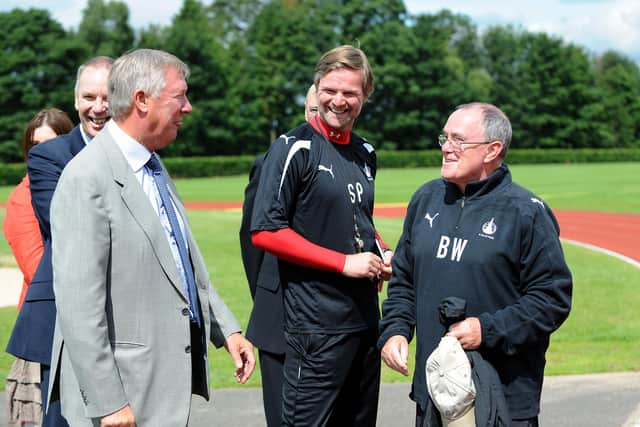

Prentice had never worked with Ferguson prior, and their paths did not converge for long. The new manager revoked the coaching duties of the striker, prompting a transfer to Ayr United for Ferguson, and with it, aborting the formative steps of his coaching career.
What would become of the forward? What would become of Falkirk?
Advertisement
Hide AdAdvertisement
Hide AdPrentice struggled again, and there was a winless run in the league that lasted until December and by October Falkirk were adrift at the bottom of the table.
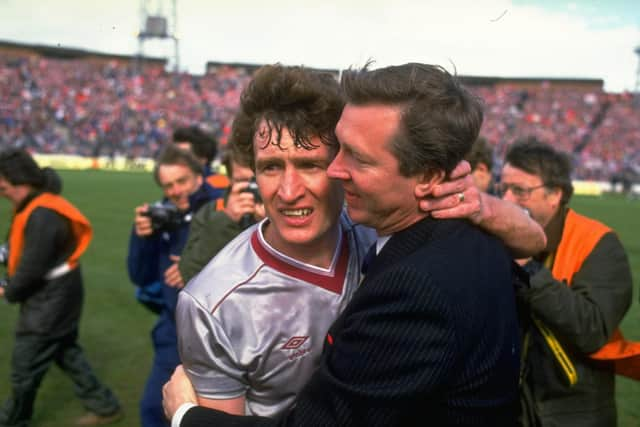

Meanwhile Ferguson was settling in at Somerset Park and when the sides met later in the season, it was obvious who would have the final say and Ferguson added to his former club’s woes with a late winner.
Falkirk would be relegated, but Ferguson would resume his Falkirk coaching duties – but in charge just along Grahams Road at Firs Park, and the rest is history.
He spent three months with the Shire before being picked up by St Mirren – a job future Falkirk caretaker Alex Smith recommended he take – where he enjoyed further success and almost joined Aberdeen before being sacked by the Buddies.
Advertisement
Hide AdAdvertisement
Hide AdA year later he did indeed head north and he famously landed the Dons the European Cup Winners’ Cup and European Super Cup in 1983 before continuing his amazing run in the dug-out with 26 trophy laden years at Old Trafford, leading Manchester United to two Champions’ League titles, a European Cup Winners’ Cup and the title of best team in the world.
And it all began in Falkirk. And it all could have started with Falkirk.
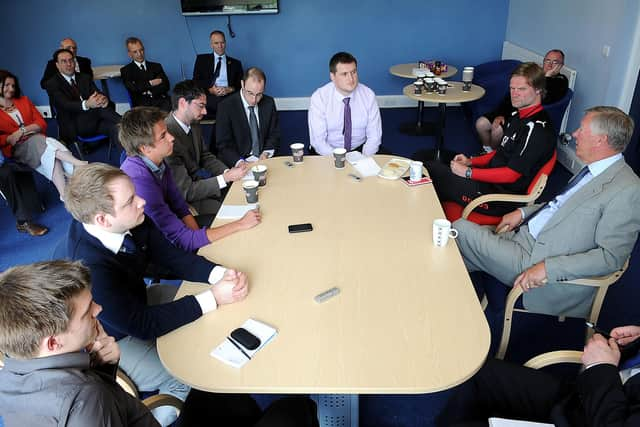

Did Falkirk miss out by not giving one of the greatest managers the world has ever seen a start? Almost certainly.
Would it have been the place for him to cut his teeth, makes his early mistakes and learn the role of manager? Perhaps.
But it could have been a success.
Advertisement
Hide AdAdvertisement
Hide AdAt East Stirlingshire, the boss only presided over 17 games, but he won more than half. Indeed he left Shire higher in the league than the Bairns when he headed for St Mirren, another side looking up at the Bainsford team.
Would it have been the same at Brockville? We’ll never know, but Falkirk were certainly worse off for not having the future knight of the realm in charge.
For the spell between John Prentice taking over the reigns for a second time in 1973, and Sir Alex’s retirement win a 5-5 draw for Manchester United at home to West Bromwich Albion in 2013, Falkirk played 1853 games. They’ve won 740 of them, a win percentage of 39.9.
Sir Alex’s record as a manager eclipses that, by almost one win in every five – extra. And at a higher level too. Of his whopping 2155 games as a boss, he won 58.4 per cent – 1253 matches.
Advertisement
Hide AdAdvertisement
Hide AdSince his departure Falkirk have won five titles in the Scottish second tier, plus the 1979-80 old style Second Division, and four Challenge Cups, while finishing runners up in the Scottish Cup three times.
The Bairns boss who never was has lifted the Scottish First Division once, three Premier Division titles, four Scottish Cups and the European Super Cup and Cup Winners’ Cup twice. He also won the Scottish League Cup and Dryborough Cup once each. Add to that a formiddable record in England with 13 league titles, nine national trophies and ten charity shields domestically and two Champions’ League itles and the FIFA Club World Cup and Intercontinental Cup, it’s barely comparable.
Never mind the silverware, how Falkirk could have used one extra win in every five games over the years, and the talents of one of the greatest managers who ever lived, who began his coaching and dug-out career, right here.
It’s good story to be associated with, a claim to fame, but with barely any benefit to the Bairns.
Message from the editor
Advertisement
Hide AdAdvertisement
Hide AdThank you for reading this story on our website. While I have your attention, I also have an important request to make of you.
In order for us to continue to provide high quality and trusted local news on this free-to-read site, I am asking you to also please purchase a copy of our newspaper.
Our journalists are highly trained and our content is independently regulated by IPSO to some of the highest standards in the world. The dramatic events of 2020 are having a major impact on many of our local valued advertisers and consequently the advertising that we receive. We are now more reliant than ever on you helping us to provide you with news by buying a copy of our newspaper.
Thank you